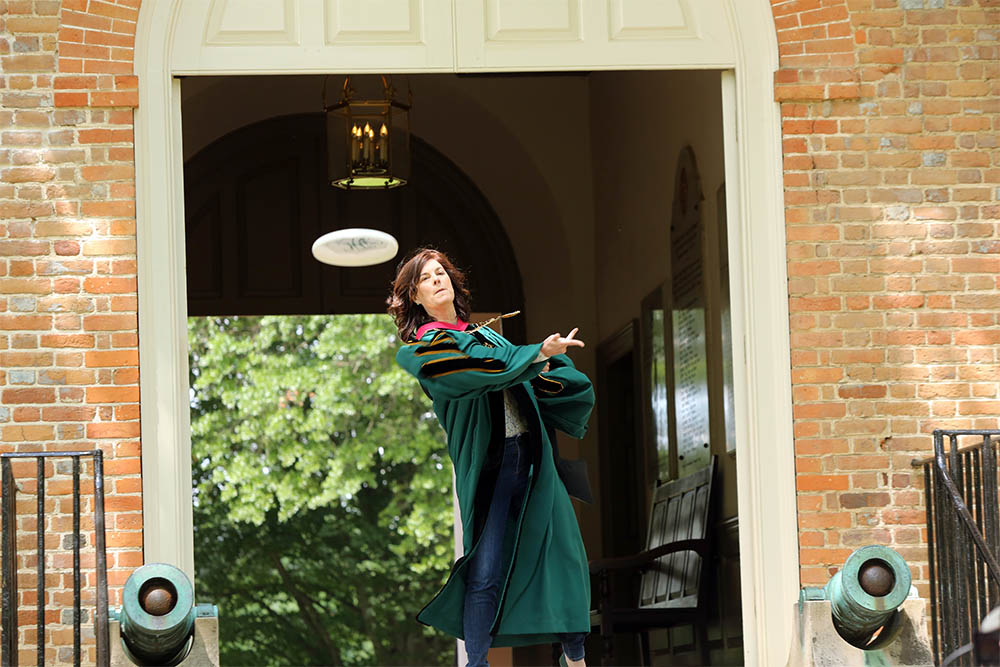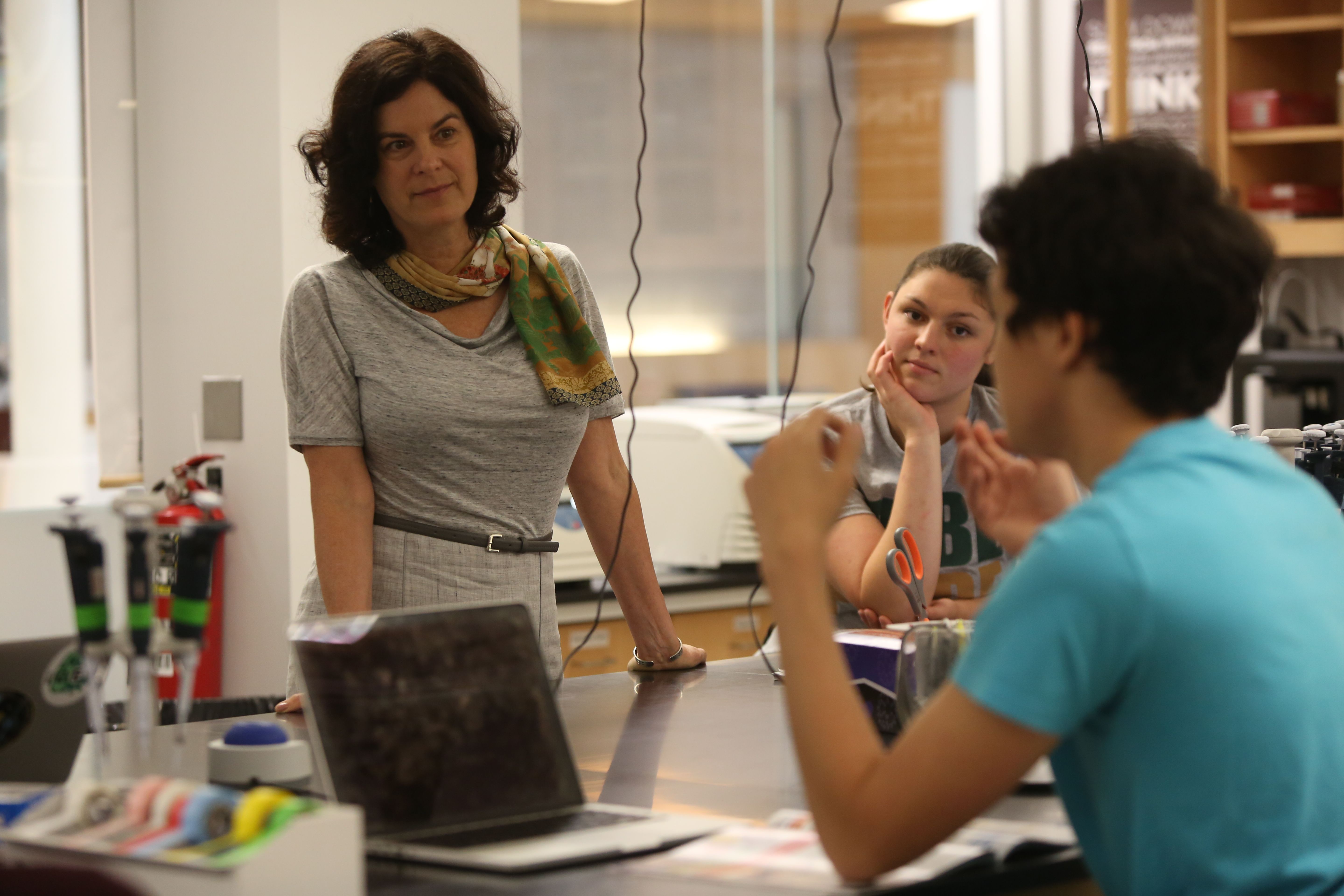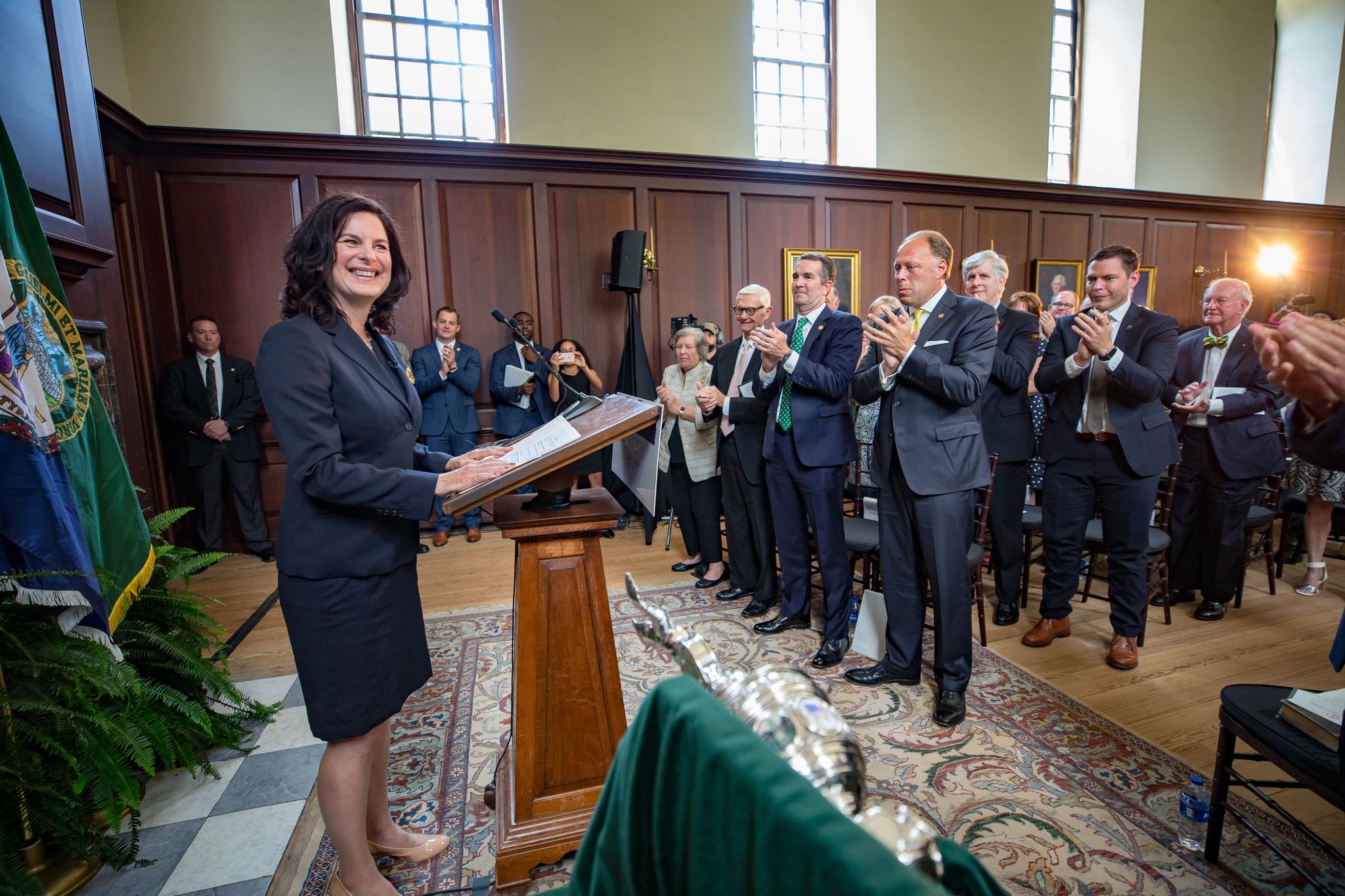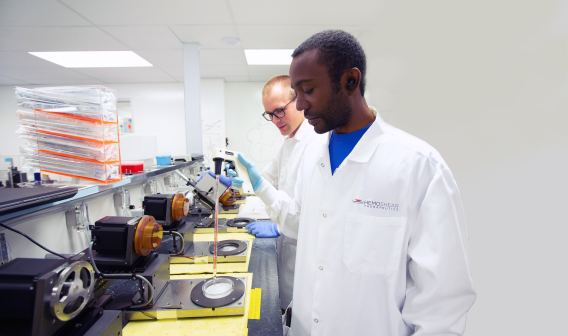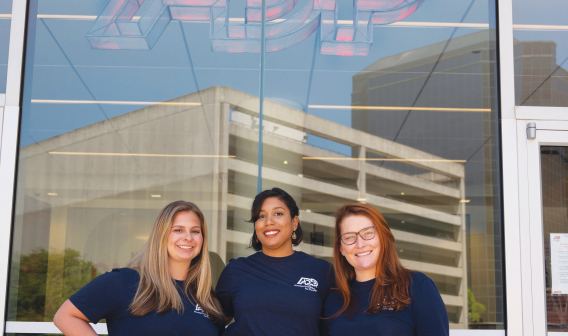Range: The Case for the Liberal Arts
A Conversation With Katherine Rowe
Dr. Katherine A. Rowe is the 28th president of William & Mary, a position she’s held since 2018 after serving as provost and dean of faculty at Smith College in Massachusetts. She’s also co-founder and CEO of Luminary Digital Media, a developer of apps enhancing engagement and learning of classic Shakespearean texts. She has published three books: “New Wave Shakespeare on Screen” with Thomas Cartelli, “Reading the Early Modern Passions: Essays in the Cultural History of Emotion” as co-editor, and “Dead Hands: Fictions of Agency, Renaissance to Modern.” VEDP President and CEO Stephen Moret spoke with her about integrating digital literacy with a classic liberal arts education, running a university during the COVID-19 pandemic, and more.
Stephen Moret: I hope you don’t mind if we start off with a question that’s at the heart of something you’re quite passionate about. Why is a liberal arts education important for college students in the 21st century? And on that note, what skills do the liberal arts instill that are relevant to today’s businesses?
Katherine Rowe: The first big-picture answer is that a liberal arts and sciences degree is the best preparation for the 21st century for professional life, for citizenship in a world that’s changing as rapidly as ours is. The distinguishing qualities of talent are going to be adaptability and range, and that’s what a liberal arts and sciences education produces.
One of the premises of a liberal arts and sciences degree is that you are going to think about big problems that we’re grappling with now — new problems, ones that haven’t been addressed before. And, you’re going to do that from multiple angles with multiple kinds of expertise and methodologies to bear.
David Epstein, in this wonderful book, “Range: Why Generalists Triumph in a Specialized World,” makes the point that the world we’re in, modern work, modern citizenship, demands knowledge transfer, “the ability to apply knowledge to new situations and different domains.”
He says, “Our most fundamental thought processes have changed to accommodate increasing complexities and the need to derive new patterns rather than rely on only familiar ones. And it’s the conceptual classification schema across different ways of thinking, different modes of work. If you can move between those different schema, that’s the scaffolding for connecting domains of knowledge, making the accessible and flexible.”
So think about the challenges we’re facing right now with COVID of scaling up testing, which is one of the critical first steps in combating the pandemic and returning to work and returning to life as we want to live together. We need the specialists very much to develop the science that’s going to get us a robust array of tests, but we need the generalists.
Moret: One of the things you’ve talked about that has really inspired me has to do with this notion of integrating digital literacy into liberal arts education. It would be great if you could talk a little bit about how a university can best prepare students for the professional world through the combination of digital literacy in a classical liberal arts education.
Rowe: I started my life as a Shakespeare scholar. I went back to graduate school as an adult, as a full professor, and retrained in media studies. That accelerated my interest in how new tools, digital tools included, can help us answer longstanding questions, can help us teach better, pursue new knowledge more effectively, and communicate what we’re learning to each other more effectively. That kicked off my life as an entrepreneur, developing, with a partner and in partnership with the Folger Shakespeare Library, an app for learning complex knowledge like a Shakespeare play.
It became really clear to me that hallmarks of professional life and citizenship now and for the century to come are going to be our ability to embrace change in technologies, understand what we gain and what we lose when we move across platforms, keep an eye on mission and core values of an organization, a business, a university, and express those as fully as possible in the new technology.
One of the real strengths of a liberal arts and sciences degree that’s infused with new technologies is that graduates are both tech-savvy and they have the classic liberal arts skills: exceptional communication, the ability to think outside of the box and look around the corner, to bring in ethical questions, and anticipate ethical challenges to new kinds of work, and to be innovative.
Another example is when thinking new ways about the structure of the curriculum. We are implementing this summer a standalone minor in data sciences so that in a single summer you can go from zero to 60 in data sciences from never having taken a class in Python, never having really thought through data visualization, not having had a stats class, and to be able at the end of the summer to have a complete minor.
The goal of this standalone minor is to take a student who might be an art history major or a math or sociology major, and to add to that sophistication in statistical analysis and in data analytics, data modeling, computational modeling, so that they can use the human questions coming from the other major and have the skillset of a data scientist to bring to bear on those questions.
Moret: What do you see as really driving the increased importance of digital literacy? We could argue it was important maybe 10 or 20 years ago, but it seems to be even more important now.
Rowe: Let’s talk a little bit about what digital literacy means for me, because many of our students are relatively fluent in new tools, social tools. They write, they think, they make videos, they communicate with each other, and they socialize with each other on an array of digital platforms. But to me the question is sophistication. As those platforms change, are there questions about business mission that are raised? Are there questions about ethics that are raised? Are there questions about community values that are raised?
That’s what the breadth of preparation in a liberal arts and sciences degree gives you. The ability to see change, to think through what could be the rebound effects. Will there be backlash? Where are the unexpected opportunities? How about we solve a problem we’ve not been able to solve before? So I think the pace of technology change is not going to slow. If anything, it will accelerate.
The consequences for democracy in the ways we communicate with each other, in the ways we share knowledge, the ways we present evidence or make arguments, those are only going to become more important. And as technology becomes more complex, it will be harder to understand how it works.
Moret: Thinking back to your inaugural address as William & Mary’s president, you referenced the tension between sustain and advance, tradition and innovation. What are the challenges in keeping one of the country’s oldest universities moving forward?
Rowe: This is the best platform ever for moving forward because we have 327 years of innovation under our belts. For two-thirds of our history, we were a private institution, and we pivoted to become public, something I embraced with real delight, but people forget that. We changed in a moment of crisis fundamentally, and we’ve done that over and over again. During COVID, it’s been instructive to think about how this institution has persevered under extraordinary challenge, wars and prior epidemics, depression, and so many shocks. What we’ve got is a long history of innovation and resourceful and creative pivoting to new approaches. And that buoys us all. I think we claim it with a lot of pride.
Moret: What do you see as William & Mary’s role in economic development in Virginia?
Rowe: We are an essential part of the region’s prosperity as I view that. I see us as having a really important responsibility to collaborate with the business community and with the state government to think about how we can create competitive advantage for Virginia and for our citizens here.
I’m thrilled that we are part of the tech talent push. As I said earlier, I see our distinctive space in the world of STEM education as STEM-plus. With a William & Mary graduate, you’re going to get somebody who may be a data scientist, but they’ll also be thinking about design aesthetics, human experience, history. We’ve got real breadth and range in that human being as a colleague, as an employee, as a member of your community.
As we think about the challenges of COVID, the commitment to returning our economy to prosperity is one that I know all of Virginia higher ed is deeply, deeply, compellingly drawn to. And as we’ve worked with the governor and his team, we’ve been thinking really hard about how we can adapt so that we are helping to speed our recovery economically.
Moret: We’ve talked a little bit around the pandemic. What’s the role of the university president in getting an institution through this kind of unprecedented situation, and what guiding principles have you drawn from in terms of leading William & Mary through the pandemic era?
Rowe: Well, the great leader of American Express during 9/11, Ken Chenault, says, “It’s the role of leadership in crisis to convey reality and instill hope.”
The first principle is that you have to say what’s true. You have to be truthful about the challenges we face, how profound they are, or people won’t trust you. We are facing existential challenges for higher ed around the country right now, and certainly in Virginia this coming year. You can talk about that in a way that’s grounded and real and also chart a path to respond to those challenges. There’s so much that we are doing and can do to respond to those challenges.
I think a couple of other principles that we’ve used create the space to respond to the human experience, so much feeling of loss and grief. So many of us know people who have passed or have friends that do. We know, we have family who are on the front lines in healthcare who have been incredibly brave and courageous this spring in protecting our communities, and we’ve been all-in to support that in a way that’s incredibly important. But taking the time to acknowledge what we’ve lost, how hard it’s been, and who’s really leaned into that has been incredibly important.
One of the principles for navigating the pandemic that we’ve used has been to make decisions in a phased way. To think in a disciplined way for the short and medium term and defer decision-making where we can so we have the best information possible.
Moret: Two other really unique things from my perspective have really stuck with me. One is that very few presidents have been entrepreneurs in their career, and you have been. Likewise, in a different sort of unique feature, you’ve actually spent more than a decade coaching ultimate Frisbee and have actually led multiple teams to state championships in Pennsylvania.
I’d love to hear you talk a little bit about how you think those experiences, being an entrepreneur, being involved in ultimate Frisbee, how they influence your leadership style and your approach to William & Mary.
Rowe: I am classically trained as a scholar and teacher, and I’m a classroom teacher. Loved teaching with a passion my whole career, but I come from a family of entrepreneurs. So in some ways, the movement into entrepreneurship was sort of an arrival back to roots.
I think, above all, the importance of working in an iterative way, a phased way, testing an idea, piloting, getting feedback, refining and rolling those refinements into the next phase. When I talk about decision-making under COVID as phased decision-making, that’s exactly what I’m thinking about. We have found that many of the resourceful strategies we have used under COVID are ones that we’re going to roll into the future of William & Mary forever, permanently.
A terrific example would be we had to take our entire admissions program online, the No. 1 thing about William & Mary that converts students, prospective students, into William & Mary students who are visiting is our campus. It’s beautiful. It’s a place that calls you in to convene and study and think with other people. And so we had to figure out how do we convey that call-in, that sense of community, at a distance digitally, and we developed strategies for digital toward the campus that showcases the faculty, forms for prospective students, one-on-one conversations, that we’re never going to go back from.
People around the country said, “This is great. I wouldn’t have been able to come to William & Mary to visit campus, but now I feel as if I have.” So that kind of gain via piloting and experimentation is a core principle of entrepreneurship, and it’s been thrilling to see the whole university embrace that under the pressure of the pandemic.
For my athletic life, there are one or maybe two things that I derive from my life as a coach and as a competitive athlete. I competed internationally at really high levels in my sport. As a coach, it’s the importance of ensuring that you’re thinking long term and that you’re connecting what we do every day to those long-term goals in a way that’s flexible so that as we compete, as we bring new players onto the team, we have one goal, which is to win the state championship. Everything we do over the course of the season in our exploratory and experimental way is about making sure that everybody on the team is fully participating and has a chance to advance that goal.
As an athlete, it’s having an understanding that there are modes of competition, collective modes for the team, which are constructive. Before that, I think I’d seen my own competitiveness as something that maybe wasn’t socially constructive. But discovering team sports for me was about discovering how to be joyfully competitive on behalf of a group, an organization, a team.
Moret: You’ve had some time now living in the president’s house. What is your favorite thing about Williamsburg that you’ve discovered since you moved there?
Rowe: Besides the students who aren’t here right now? Students are always the favorite thing. The food, culture. I didn’t know this was such a foodie town. The restaurants are amazing and varied and wonderful, and there’s a real appreciation of local, locally grown recipes.
More broadly in the region, Jamestown Island — the archaeology that’s happening there, the dig. It’s unbelievable. Unlike anything else in the United States.
Moret: How do you think America and/or American higher education could permanently change after everything going on with the pandemic has been settled?
Rowe: We’re in the process of discovering the answer to that question. At William & Mary, I can say a couple of things that I see happening right now. First of all, nobody in the country would have ever called higher ed nimble, right? And yet across the country, universities and colleges moved to distance modes in the space of a few short weeks.
At William & Mary, we took 2,000-plus courses online in less than 10 days. And when I say online, this isn’t online learning as we classically understood it, courses that are designed for a specific purpose. We resourcefully used every technology available to take courses that had never been imagined that way, with faculty and staff who’d never done that work before, and students who’d never experienced that before, and together we brought ourselves into distant learning and finished the semester.
And the challenges of that — it was far from perfect — weren’t about the technology. They were about quarantine. A student said something really brilliant to me about a month in: “It’s not that this is so hard because we’re learning from home. It’s that we’re trying to finish the semester under quarantine.”
The resilience of our students and our faculty and staff has been phenomenal. We know, and this generation knows, that it can take something extraordinarily hard and be successful with it. But the great lesson in resilience that this generation is learning is really profound.
Moret: That’s wonderful, Dr. Rowe. It’s always a great pleasure talking with you. Is there anything else you’d like to share that we haven’t covered?
Rowe: I’ve been so grateful for the collaborations I’ve found here. I arrived from western Massachusetts having been able to build a collaboration between industry and higher ed that I was really proud of to launch a new data sciences major in the five colleges with Mass Mutual. And I wondered whether I could find that kind of partnership here. We’re so fortunate to come to Virginia where the higher ed leadership, the business community, and the Commonwealth leadership were already thinking in that collaborative way and recognizing what a competitive advantage it would be for Virginia for us to be able to retain talent. And that’s something we have to focus on, right now and in the years to come, is how to keep our extraordinary talent in Virginia. I’m really looking forward to working with you all to make sure we can.
Moret: We are thrilled to have you in the Commonwealth of Virginia. We’re so fortunate as a state to have so many incredible higher education institutions, William & Mary among the many finest — not just in Virginia, but around the world — and excited to collaborate with you in the years ahead. Thank you so much for joining us today.
Rowe: It’s been a real pleasure. Thank you.
For the full interview, visit www.vedp.org/Podcasts
